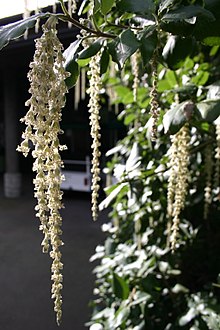Garrya
| Garrya | |
|---|---|

| |
| Garrya catkins in February at Woodland Park Zoo in Seattle, Washington. | |
| Scientific classification | |
| Kingdom: | Plantae |
| Clade: | Tracheophytes |
| Clade: | Angiosperms |
| Clade: | Eudicots |
| Clade: | Asterids |
| Order: | Garryales |
| Family: | Garryaceae |
| Genus: | Garrya Douglas ex Lindl. |
| Synonyms[1] | |
| |
Garrya is a genus of flowering plants in the family Garryaceae native to Mexico, the western United States, Central America and the Greater Antilles.[1] Common names include silk tassel and tassel bush.[2][page needed]
They are evergreen dioecious wind-pollinated shrubs growing to 1–5 m (3–16 ft) tall. The leaves are arranged in opposite pairs, and are simple, leathery, dark green to gray-green, ovate, 3–15 cm (1–6 in) long, with an entire margin and a short petiole. The flowers are gray-green catkins, short and spreading when first produced in late summer; the male catkins becoming long (3–20 cm (1–8 in)) and pendulous in late winter when shedding pollen; the female catkins usually a little shorter and less pendulous. The fruit is a round dry berry containing two seeds.[3]
Species
- Garrya buxifolia – dwarf silktassel; western Oregon, northern California
- Garrya congdonii – chaparral silktassel; California
- Garrya corvorum – Guatemala
- Garrya elliptica – coast silktassel, wavyleaf silktassel; western Oregon, western California
- Garrya fadyenii – Fadyen's silktassel; Cuba, Jamaica, Hispaniola; naturalised in Leeward Islands
- Garrya flavescens – ashy silktassel; California and Baja California, northeast to Utah and New Mexico
- Garrya fremontii – bearbrush silktassel; southern Washington, Oregon, California, northwestern Nevada
- Garrya glaberrima – Coahuila, Tamaulipas, Nuevo León
- Garrya goldmannii – southeastern New Mexico, southwestern Texas, and northeastern Mexico
- Garrya grisea – Baja California
- Garrya laurifolia – laurelleaf silktassel; widespread from Chihuahua and Tamaulipas south to Panama
- Garrya lindheimeri – southwestern Texas and northeastern Mexico
- Garrya longifolia – Durango, Jalisco, Guerrero, Michoacán, Oaxaca, Morelos, Mexico State, Distrito Federal de México
- Garrya mexicana – southern Nuevo León
- Garrya ovata – eggleaf silktassel; New Mexico, Texas, Chihuahua, Oaxaca
- Garrya salicifolia – willowleaf silktassel; Baja California, Baja California Sur
- Garrya veatchii – canyon silktassel; California, Baja California
- Garrya wrightii – Wright's silktassel; Arizona, New Mexico, Texas, Chihuahua, Sonora, Durango, Coahuila
Cultivation and uses
Some species, notably Garrya elliptica, are widely cultivated in gardens for their foliage and the catkins produced in late winter. They are frequently grown against a wall, or as a windbreak in coastal areas.[4] Male plants are more widely grown, as their catkins are longer and more attractive; one such cultivar, G. elliptica 'James Roof', has catkins up to 35 cm (14 in) long. The hybrids G. × issaquahensis (G. elliptica × G. fremontii) and G. × thuretii (G. elliptica × G. fadyenii) have been bred for garden planting.
References
- ^ a b Govaerts, R. "Garrya Douglas ex Lindl". World Checklist of Selected Plant Families. Royal Botanic Gardens.
- ^ Gledhill, David (1996) [1989]. The Names of Plants (2nd ed.). Cambridge, UK: Cambridge University Press. ISBN 9780521366755.
- ^ Dahling, Gerald V. (1978). "Systematics and evolution of Garrya". Contributions from the Gray Herbarium of Harvard University (209). Harvard University Herbaria: 1, 3–104. doi:10.5962/p.336448. JSTOR 41764821. S2CID 249085312.
- ^ Brickell, Christopher; Royal Horticultural Society (2008). RHS A–Z Encyclopedia of Garden Plants. Vol. 2 (3rd ed.). United Kingdom: Dorling Kindersley. p. 1128. ISBN 978-1405332965.
